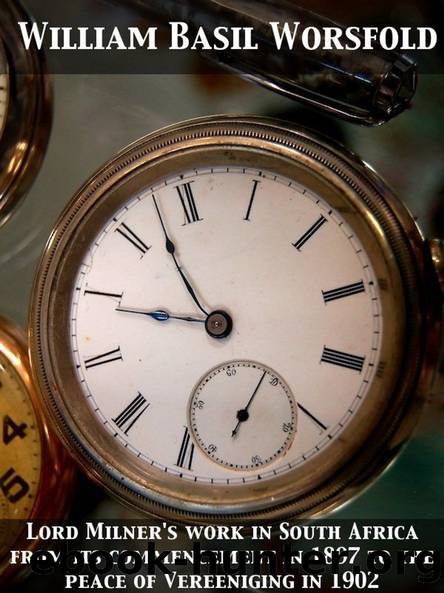Lord Milner's Work in South Africa by W. Basil (William Basil) Worsfold

Author:W. Basil (William Basil) Worsfold [Worsfold, W. Basil]
Language: eng
Format: epub
Tags: Nonfiction, History, Africa, South Africa
ISBN: 9782819905493
Google: uwt5wgEACAAJ
Publisher: Library of Alexandria
Published: 2009-07-29T04:00:00+00:00
Conventions to be annulled.
This reply has been cited at length for two reasons. In the first place it affords a concise and weighty statement of the British case against the Republics, and, in the second, it contains a specific and reasoned declaration of the central decision of the Salisbury Cabinet, against which the efforts both of the Dutch party in the Cape and of the friends of the Boers in England continued to be directed, until the controversy was closed by the surrender of the republican leaders at Vereeniging. In the Cape Colony the cry of "conciliation" was raised to cloak the gross appearance of a movement which was, in fact, a direct co-operation with the enemy. And the same specious word was adopted in England, so soon as the strain of the war had begun to make itself felt in the constituencies, as a decent flag under which the party opponents of the Unionist Government in general could join forces with the traditional friends of the Boers and other convinced opponents of Imperial consolidation. The decision of the Salisbury Cabinet not to restore the system of the Conventions, which was in fact the decision of the great mass of the British people both at home and over-sea, was not reversed. It was confirmed in the House of Commons by 208 votes against 52 on July 25th, 1900, and by the verdict of the country in the General Election which followed.[209] But the political agitation by which it was sought to reverse this decision was none the less injurious alike to the Boer and British peoples, since it acted as a powerful incentive to the republican leaders to continued struggle which, except for the illusions created by this agitation, they would have recognised as hopeless in itself and unjustified by any prospect of military success. In both cases the effect of the agitation was the same: the war was unnecessarily prolongedâintentionally by the Afrikander nationalists, and unintentionally by Lord (then Mr.) Courtney, Mr. Morley, Mr. Bryce, and other opponents in England of the annexation of the Republics.
The 'Conciliation' movement.
The Presidents had demanded the recognition of the independence of the Republics and a free pardon for the Cape rebels as the price of peace. The Afrikander nationalists at once began to co-operate with the Republics in the endeavour to wrest these terms from the British Government. Mr. Schreiner, as we have seen, had already incurred Mr. Hofmeyr's displeasure by allowing the Cape Government to render assistance to the Imperial authorities in the prosecution of the war. The breach thus created between the Prime Minister and Sir Richard (then Mr.) Solomon, on the one hand, and Dr. Te Water, Mr. Merriman, and Mr. Sauer, who shared the views of the Bond, on the other, was, rapidly widened by the "conciliation" meetings held throughout the Colony by the Afrikander nationalists in support of the "peace overtures" of the Presidents. The British population at the Cape was quick to realise the insidious and fatal character of the "conciliation" movement thus inaugurated by the Afrikander nationalists.
Download
This site does not store any files on its server. We only index and link to content provided by other sites. Please contact the content providers to delete copyright contents if any and email us, we'll remove relevant links or contents immediately.
| Africa | Americas |
| Arctic & Antarctica | Asia |
| Australia & Oceania | Europe |
| Middle East | Russia |
| United States | World |
| Ancient Civilizations | Military |
| Historical Study & Educational Resources |
Goodbye Paradise(2971)
Men at Arms by Terry Pratchett(2408)
Tobruk by Peter Fitzsimons(2064)
Pirate Alley by Terry McKnight(1910)
Arabs by Eugene Rogan(1838)
Borders by unknow(1789)
Belonging by Unknown(1472)
The Biafra Story by Frederick Forsyth(1326)
It's Our Turn to Eat by Michela Wrong(1305)
Botswana--Culture Smart! by Michael Main(1238)
A Winter in Arabia by Freya Stark(1225)
Gandhi by Ramachandra Guha(1196)
Coffee: From Bean to Barista by Robert W. Thurston(1183)
Livingstone by Tim Jeal(1152)
The Falls by Unknown(1142)
The Source by James A. Michener(1135)
The Shield and The Sword by Ernle Bradford(1101)
Egyptian Mythology A Fascinating Guide to Understanding the Gods, Goddesses, Monsters, and Mortals (Greek Mythology - Norse Mythology - Egyptian Mythology) by Matt Clayton(1088)
Africa: Altered States, Ordinary Miracles by Richard Dowden(1078)
